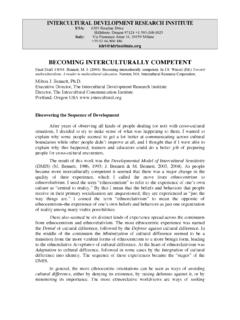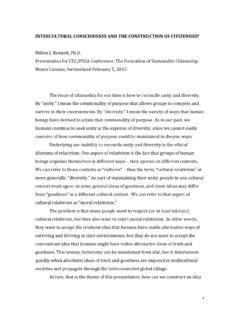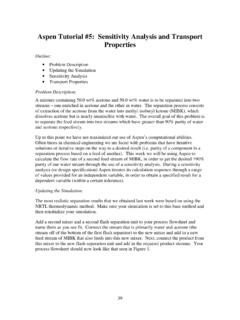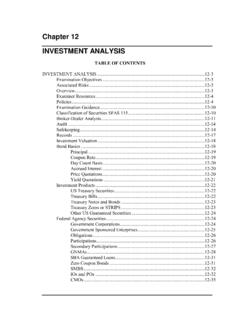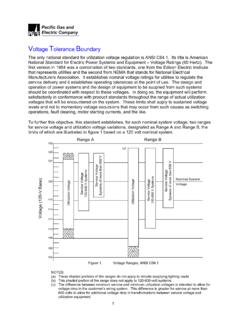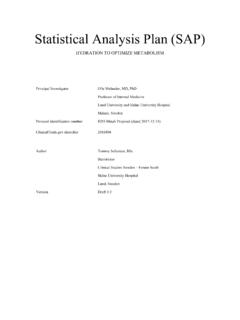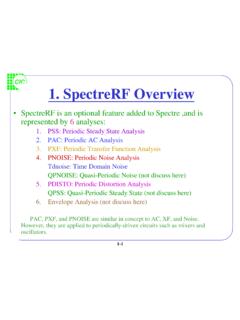Transcription of A DEVELOPMENTAL MODEL OF INTERCULTURAL …
1 Milton J. Bennett, 1986, 1993, 2002, 2005, 2011 THE INTERCULTURAL DEVELOPMENT RESEARCH INSTITUTE USA: 1603 NE Rosebay Drive Hillsboro, Oregon 97124 +1 503-268-1025 Italy: Via Francesco Arese 16, 20159 Milano +39 02 6680 0486 A DEVELOPMENTAL MODEL OF INTERCULTURAL sensitivity Milton J. Bennett, I. DENIAL OF DIFFERENCE People with this predominant experience are in denial about cultural difference they are unable to experience differences in other than extremely simple ways.
2 They may be perplexed when asked about their own culture, because they have not considered how culture impacts their own or others lives. They might ask well-meant but naive questions about other cultures ( do they have television in Japan? ) and make superficial statements of tolerance ( live and let live ). In some cases, people with this orientation may dehumanize others, assuming that different behavior is a deficiency in intelligence or personality. Denial/Disinterest: Isolation in homogeneous groups fails to generate either the opportunity or the motivation to construct relevant categories for noticing and interpreting cultural difference.
3 Denial/Avoidance: Intentional separation from cultural difference protects worldview from change by creating the conditions of isolation. Some awareness of cultural difference may yield undifferentiated broad categories, such as foreigner or Asian or people of color. Perceptual process: Failure to differentiate culture as a category, thus an inability to perceive or construe data from differing cultural contexts. Exercise Of Power: Possibility of exploitation At This Stage, Learners Say: Live and let live, that s what I say.
4 All big cities are the same lots of buildings, too many cars, McDonalds. As long as we all speak the same language, there s no problem. The main concerns I have involve knowing how to get around and ordering in restaurants. With my experience, I can be successful in any culture without any special effort I never experience culture shock. All I need to know about is politics and history I can figure out the rest of it as I go along. Milton J. Bennett, 1986, 1993, 2002, 2005, 2011 DEVELOPING INTERCULTURAL sensitivity : DENIAL DEVELOPMENTAL TASK: To recognize the existence of cultural differences To begin the reconciliation of stability and change CHALLENGE AND SUPPORT: Learners experience of difference: High Challenge Educators should emphasize: High Support TO SUPPORT THE LEARNERS: Content: Objective culture: Art, music, literature, theatre, dance Heroes and holidays Culture specific social science.
5 Politics, history, economics, sociology Travel tips: Do s and taboos Use symbols, not target cultures Process: Illustrate ideas with user-friendly activities Embed differences in non-threatening contexts Promote an inclusive, non-blaming climate Address learner anxieties in existing categories, but limit time Build on what they already know TO CHALLENGE THE LEARNERS: Content: Subjective culture: Selected values, beliefs, and behaviors A positive vision of INTERCULTURAL interaction Process: Arouse curiosity Facilitate structured contact with other cultures through films, slides, panel presentations, etc.
6 Milton J. Bennett, 1986, 1993, 2002, 2005, 2011 II. DEFENSE AGAINST DIFFERENCE People with a predominant experience of Defense experience cultural difference in a polarized way us and them. They feel under siege by people that they stereotype in simplistic and negative ways, protecting themselves with a hardened boundary between themselves and the others. Typically, one s own culture is exalted, and other cultures are denigrated with negative stereotypes. This hierarchical view of culture may lead people to assume a kind of social Darwinism wherein they place their own culture at the acme of development and civilization.
7 A common variation is a Reversal of the two poles, so that one s own culture is denigrated and other cultures are uncritically lauded. While Reversal may superficially seem to be more culturally sensitive, it is nevertheless still dualistic and overly simplistic. Defense/Denigration: The existing cultural worldview is protected by negatively evaluating persons with different cultural behaviors or values. Defense/Superiority: The existing cultural worldview is protected by exaggerating its positive aspects compared to all other cultures.
8 Any neutral or positive statement about another culture may be interpreted as an attack. Defense/Reversal: Tendency to see another culture as superior while maligning one s own, exemplified by going native among long-term sojourners or the false ally among some dominant-culture seekers of minority approval. Perceptual process: categories for culture and cultural difference are better-elaborated, but data is organized into polarized evaluative categories, making neutral statements about cultural difference impossible and thus masking sophisticated differences with simplified stereotypes.
9 Exercise of Power: Exclusionary denial of equal opportunity. At this stage, learners say: Why don t these people speak my language? When I go to other cultures, I realize how much better my own culture is. My culture should be a MODEL for the rest of the world. These people don t value life the way we do. Boy, could we teach these people a lot of stuff. What a sexist society! These people are so urbane and sophisticated, not like the superficial people back home. I am embarrassed by my compatriots, so I spend all my time with the host country nationals.
10 I wish I could give up my own cultural background and really be one of these people. Milton J. Bennett, 1986, 1993, 2002, 2005, 2011 DEVELOPING COMPETENCE: DEFENSE DEVELOPMENTAL TASK: Mitigate polarization by emphasizing common humanity Distribute criticism equally CHALLENGE AND SUPPORT: Learners experience of difference: Maximum Challenge Educators should emphasize: Maximum Support TO SUPPORT THE LEARNERS: Content: Universality of ethnocentrism (in-group/out-group distinctions) Existing (but previously unaddressed) differences within the in-group (such as learning styles, personality type, etc.)
